Past Learning Cases
BIG IDEAS Digital Learning Cases describe the what, how, and when of past projects of BIG IDEAS in-School. Project reflections from teachers, artists and learners are documented as evidence on how the unit of study open inquiry or create cross–curricular learning opportunity. Learners and teachers are asked to reflect on ways they have grown as a learner or professionally.
Learning Cases
2017 Making Global Connection
Vancouver Biennale’s BIG IDEAS Education invites cross-curricular project proposals that focus on the theme of global connections throughout the entire inquiry learning process. Successful submissions should articulate clear and significant common concerns, community challenges, social issues or aspirations that communities across the globe may share. The inquiry process will focus on a specific Biennale art installation(s) that inspires the BIG IDEAS project. Participants are encouraged to link with schools in other countries if possible. During a field trip (or BIG IDEAS Anywhere1 virtual tour) to the art installation(s) being studied participants are encouraged to explore specific aspects of the community around it and compare/contrast to another community(s) being studied in a different part of the world.
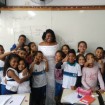 Affonso Várzea: How Do Humans Affect The Environment?Brazilian students explored their own environment while making connections with Canada.
Affonso Várzea: How Do Humans Affect The Environment?Brazilian students explored their own environment while making connections with Canada.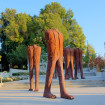 Captain Cook Elementary: Globally Aware – Future Change AgentsStudents examine topics relating to the environment.
Captain Cook Elementary: Globally Aware – Future Change AgentsStudents examine topics relating to the environment.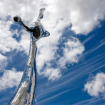 Cunningham Elementary: Water is LifeAn interdisciplinary exploration through poetry, song writing, dance & theatre elements.
Cunningham Elementary: Water is LifeAn interdisciplinary exploration through poetry, song writing, dance & theatre elements.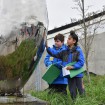 Daniel Woodward Elementary: We Are All ConnectedStudents inquired into their connections to one another and to the environment.
Daniel Woodward Elementary: We Are All ConnectedStudents inquired into their connections to one another and to the environment.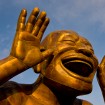 David Lloyd George: Our Lives through Music and ArtA collective voice on the challenges in live students face today.
David Lloyd George: Our Lives through Music and ArtA collective voice on the challenges in live students face today.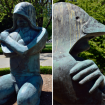 Eagle Mountain: How do stories help our identities evolve?An inquiry into identity and making global connection through spoken word.
Eagle Mountain: How do stories help our identities evolve?An inquiry into identity and making global connection through spoken word.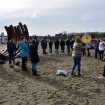 École Bilingue: Balancing SymbolsThe students explored symbols in our society expressed through nature, sounds, and light.
École Bilingue: Balancing SymbolsThe students explored symbols in our society expressed through nature, sounds, and light.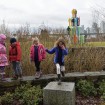 École Cedardale: Sharing the PlanetAn exploration of Canada’s diversity as represented through the arts.
École Cedardale: Sharing the PlanetAn exploration of Canada’s diversity as represented through the arts. École Qayqayt Elementary: Environmental StewardshipStudents explored their own environments & cultures while making connections with Brazil.
École Qayqayt Elementary: Environmental StewardshipStudents explored their own environments & cultures while making connections with Brazil.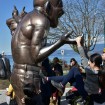 General Currie Elementary: Exploring IdentityStudents explored identity and how they express themselves, choices, empathy and inclusion.
General Currie Elementary: Exploring IdentityStudents explored identity and how they express themselves, choices, empathy and inclusion.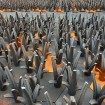 Grandview Elementary: Together We Are StrongerStudents inquire into values of cooperation, acceptance, compassion, and responsibility.
Grandview Elementary: Together We Are StrongerStudents inquire into values of cooperation, acceptance, compassion, and responsibility.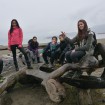 Kerrisdale Elementary: Trees TransformingInquiry into how citizenship and artistic practice contribute to the vision of the world.
Kerrisdale Elementary: Trees TransformingInquiry into how citizenship and artistic practice contribute to the vision of the world. McNair Secondary: Building a Chorus of Voices for our Youth to Stand TallStudents construct/discover their own story as connected to others through art,
McNair Secondary: Building a Chorus of Voices for our Youth to Stand TallStudents construct/discover their own story as connected to others through art,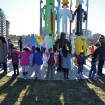 Mitchell Elementary: My Story, Our StoryThrough drama and visual arts, students explored their personal stories and traditions.
Mitchell Elementary: My Story, Our StoryThrough drama and visual arts, students explored their personal stories and traditions.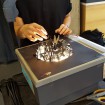 Mulgrave World School: New Media a/r/tographical collaborationAn open inquiry project with a focus on the themes of collaboration and light play.
Mulgrave World School: New Media a/r/tographical collaborationAn open inquiry project with a focus on the themes of collaboration and light play.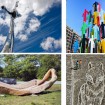 Surrey Schools Drama ProjectsStudents from 4 schools engaged into cross-curricular learning through drama.
Surrey Schools Drama ProjectsStudents from 4 schools engaged into cross-curricular learning through drama.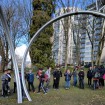 Westwind Elementary: The ME in MEdiaAn inquiry into how global media play a vital role in shaping identity norms.
Westwind Elementary: The ME in MEdiaAn inquiry into how global media play a vital role in shaping identity norms.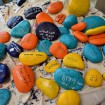 York House: Reimagining the Arbutus GreenwayStudents reimagine a sustainable design for the Arbutus Corridor.
York House: Reimagining the Arbutus GreenwayStudents reimagine a sustainable design for the Arbutus Corridor.
2016 Art as a Catalyst for Learning
Vancouver Biennale’s BIG IDEAS Education invites cross-curricular project proposals that demonstrate how art is a catalyst for learning throughout the entire project-based learning process. Successful submissions should articulate clear and direct linkages to specific Biennale art installation(s) that inspire the BIG IDEAS project, guiding questions, inquiry challenges, and art-infused creations. Submissions should also consider exploring specific aspects of the community around the art installation(s) that are relevant to the project theme as part of the field trip.
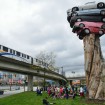 Archibald Blair: Art for Social ChangeAn examination of the intersecting relationship between identity, art and activism.
Archibald Blair: Art for Social ChangeAn examination of the intersecting relationship between identity, art and activism.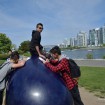 Burnett Secondary: Outsiders as Agents of ChangeAn inquiry into how society shapes individuals,
Burnett Secondary: Outsiders as Agents of ChangeAn inquiry into how society shapes individuals,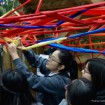 Crofton House: Art as a Catalyst for Environmental StewardshipA collective exploration of art as an extension of nature and how it can effect social change.
Crofton House: Art as a Catalyst for Environmental StewardshipA collective exploration of art as an extension of nature and how it can effect social change.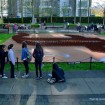 Eagle Mountain: How Does Art Communicate the Human Experience?An inquiry into art and global issues and representing the issues through visual art.
Eagle Mountain: How Does Art Communicate the Human Experience?An inquiry into art and global issues and representing the issues through visual art.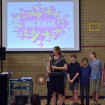 École Bilingue (Grade 1): Our Natural and Human Made WorldAn Inquiry into natural and human-made aspects of our environment.
École Bilingue (Grade 1): Our Natural and Human Made WorldAn Inquiry into natural and human-made aspects of our environment.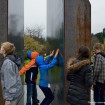 École Bilingue (Grade 7): Is Home away from Home?Students describe their home if the man made borders did not exist.
École Bilingue (Grade 7): Is Home away from Home?Students describe their home if the man made borders did not exist.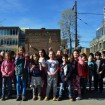 École Cedardale: Ma lumière intérieure (The Light in Me)An Inquiry into how humans use light and sound to help tell their stories.
École Cedardale: Ma lumière intérieure (The Light in Me)An Inquiry into how humans use light and sound to help tell their stories.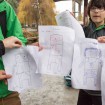 École Pauline Johnson – Eye of a NeedleA multi-layered exploration of the fast fashion industry.
École Pauline Johnson – Eye of a NeedleA multi-layered exploration of the fast fashion industry.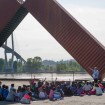 École Qayqayt Elementary: GalimotosAn Intercultural Exploration of Resourcefulness, Repurposing & Resilience.
École Qayqayt Elementary: GalimotosAn Intercultural Exploration of Resourcefulness, Repurposing & Resilience.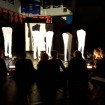 Handsworth Secondary: An Intersection of Visual Art & MusicA powerful collaborative response to Symphony #1, In Memoriam – Dresden 1945.
Handsworth Secondary: An Intersection of Visual Art & MusicA powerful collaborative response to Symphony #1, In Memoriam – Dresden 1945.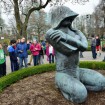 Hillcrest Middle School: Our Clothes, OurselvesAn explortion of the impact that clothing has on relationships and self-image.
Hillcrest Middle School: Our Clothes, OurselvesAn explortion of the impact that clothing has on relationships and self-image.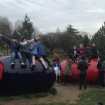 Kerrisdale Elementary: Art and EvolutionAn inquiry into how evolution and change are inevitable and the impact of our decisions.
Kerrisdale Elementary: Art and EvolutionAn inquiry into how evolution and change are inevitable and the impact of our decisions.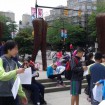 McKinney Elementary: The Poetry of our Crossed PathsAn examination of the nature of immigration in the school’s community in Steveston.
McKinney Elementary: The Poetry of our Crossed PathsAn examination of the nature of immigration in the school’s community in Steveston.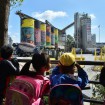 Mitchell Elementary: Talking Poles – The Voices of our TotemsThe students began a past, present and future journey of exploration of their own stories.
Mitchell Elementary: Talking Poles – The Voices of our TotemsThe students began a past, present and future journey of exploration of their own stories.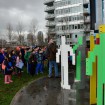 Quilchena Elementary: Intersections of identity, place and timeStudents investigated personal identity, family history and their connection to the land.
Quilchena Elementary: Intersections of identity, place and timeStudents investigated personal identity, family history and their connection to the land.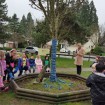 Surrey Schools: Environmental Volunteerism & Social Action300+ students from 12 schools inquired into how art can inspire environmental social action.
Surrey Schools: Environmental Volunteerism & Social Action300+ students from 12 schools inquired into how art can inspire environmental social action.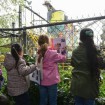 Woodward Elementary: Fostering Identity through the Power of Place, Emotions and RelationshipsThe school courtyard was used to facilitate student learning.
Woodward Elementary: Fostering Identity through the Power of Place, Emotions and RelationshipsThe school courtyard was used to facilitate student learning.
2015 Learning without Borders
Inspired by the 2014-2016 exhibition theme Open Borders / Crossroads Vancouver, teachers were invited to create projects that would aim to open up existing borders in the learning process or to open up borders in language, religion, ethnicity, nation, and Indigeneity. The project-based learning approach focus on the development of students’ communication and thinking skills, personal and social competencies. In 2015, 22 local professional artists have been placed in 68 classes across 7 school districts through the Vancouver Biennale BIG IDEAS artist collaborator grants.
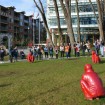 Artists for Kids Academy: Meeting PointAn inquiry into the ideas of the individual vs the collective through sculptural collaboration.
Artists for Kids Academy: Meeting PointAn inquiry into the ideas of the individual vs the collective through sculptural collaboration.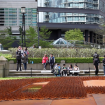 Burnett Secondary: Change and RevolutionThis project is an inquiry into the topic of change, both small-scale and revolutionary.
Burnett Secondary: Change and RevolutionThis project is an inquiry into the topic of change, both small-scale and revolutionary.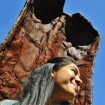 Cambie Secondary: Crossroads: Taking the Road Less TravelledThis project is an inquiry into the topic of free will and choice.
Cambie Secondary: Crossroads: Taking the Road Less TravelledThis project is an inquiry into the topic of free will and choice.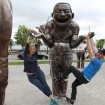 Captain Cook Elementary: Me, Myself, and I: the Many Faces of MeThis project explored the many faces, masks, and characters that young people adopt.
Captain Cook Elementary: Me, Myself, and I: the Many Faces of MeThis project explored the many faces, masks, and characters that young people adopt.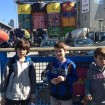 Cypress Park Primary: Personal PassionsAn inquiry into personal passions and expressing that through arts.
Cypress Park Primary: Personal PassionsAn inquiry into personal passions and expressing that through arts.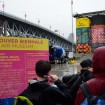 Eagle Mountain Middle School : Exploration of HistoryAn inquiry into the environment shapes how people develop.
Eagle Mountain Middle School : Exploration of HistoryAn inquiry into the environment shapes how people develop.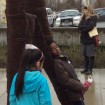 École Bilingue: Toi & Me = NousAn inquiry into how understanding loneliness can break down walls between us.
École Bilingue: Toi & Me = NousAn inquiry into how understanding loneliness can break down walls between us.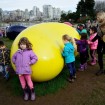 École Cedardale Elementary: Full of BeansStudents inquire into the use of all the senses and the recognition of different perspectives.
École Cedardale Elementary: Full of BeansStudents inquire into the use of all the senses and the recognition of different perspectives.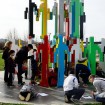 École Jules Quesnel: Diversity and Human InterconnectivityStudents explored diversity and how to build positive human connectivity.
École Jules Quesnel: Diversity and Human InterconnectivityStudents explored diversity and how to build positive human connectivity.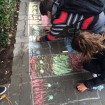 École Moody Middle School of the Arts (EMMSOTA)A school-wide celebration of Medieval Times and engagement through the arts.
École Moody Middle School of the Arts (EMMSOTA)A school-wide celebration of Medieval Times and engagement through the arts.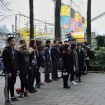 Eric Hamber: Altered Perspectives & IdentityAn exploration of altered perspectives and identity through mask making.
Eric Hamber: Altered Perspectives & IdentityAn exploration of altered perspectives and identity through mask making.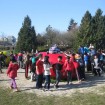 General Currie Elementary: Cooperation or CompetitionStudents explore into how humans impact one another.
General Currie Elementary: Cooperation or CompetitionStudents explore into how humans impact one another.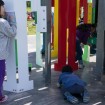 General Currie: Cultivating Identity Through the GardenExplore how cultures are influenced by the local environment & contact with other cultures.
General Currie: Cultivating Identity Through the GardenExplore how cultures are influenced by the local environment & contact with other cultures.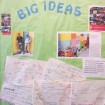 Kerrisdale Elementary: Public Art, Power & PopulaceCreating a multimedia presentations communicating the changes students want to see in the world.
Kerrisdale Elementary: Public Art, Power & PopulaceCreating a multimedia presentations communicating the changes students want to see in the world.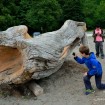 Lord Selkirk Elementary: Nature and Humans IntertwinedAn inquiry into the interdependency of living things and humans in the environment.
Lord Selkirk Elementary: Nature and Humans IntertwinedAn inquiry into the interdependency of living things and humans in the environment.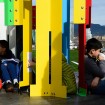 McKinney Elementary: Visualizing Human RightsExploring human rights with artists’ lenses.
McKinney Elementary: Visualizing Human RightsExploring human rights with artists’ lenses.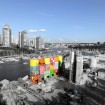 McNair Secondary: Holding a Mic Up to the Youth TodayStudents uncover beauty and uniqueness in unexpected places
McNair Secondary: Holding a Mic Up to the Youth TodayStudents uncover beauty and uniqueness in unexpected places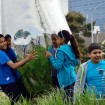 Mitchell Elementary: Air, Fire, Water, Earth – Teachings from the Medicine WheelAn exploration of the power of the Circle in First Nations tradition.
Mitchell Elementary: Air, Fire, Water, Earth – Teachings from the Medicine WheelAn exploration of the power of the Circle in First Nations tradition.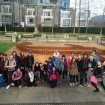 Montroyal Elementary: PerspectivesExploring how perspective can be represented, how it can influence understanding.
Montroyal Elementary: PerspectivesExploring how perspective can be represented, how it can influence understanding.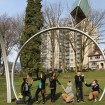 North Delta Secondary: News FlashInquiry through the development of relevant & socially conscious current event video segments.
North Delta Secondary: News FlashInquiry through the development of relevant & socially conscious current event video segments.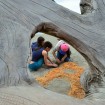 Queen Mary Elementary: Connecting Art and ScienceA day at the beach immersed in art creation using natural materials.
Queen Mary Elementary: Connecting Art and ScienceA day at the beach immersed in art creation using natural materials.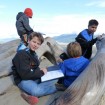 Quilchena Elementary: Crossroads between environmental sustainability & human rightsExploring ways to effect changes for environmental sustainability.
Quilchena Elementary: Crossroads between environmental sustainability & human rightsExploring ways to effect changes for environmental sustainability.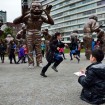 St. Francis Xavier: The Impact of Human EmotionsExploring how emotions impact, influence, control, shape interactions with self & others.
St. Francis Xavier: The Impact of Human EmotionsExploring how emotions impact, influence, control, shape interactions with self & others.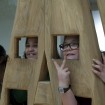 Surrey Schools: Farming, Food Systems & Sustainability300+ students from 11 schools inquired into "Farming, Food Systems and Sustainability".
Surrey Schools: Farming, Food Systems & Sustainability300+ students from 11 schools inquired into "Farming, Food Systems and Sustainability".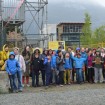 University Hill Elementary: Reflections Through the Eyes of the WolfAn inquiry into collaboration and unity in community.
University Hill Elementary: Reflections Through the Eyes of the WolfAn inquiry into collaboration and unity in community.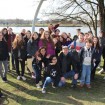 Windermere Secondary: News FlashLearning through the development of relevant and socially conscious current event show segments.
Windermere Secondary: News FlashLearning through the development of relevant and socially conscious current event show segments.
2014 Cross-Curricular Challenge
Based on the 2014-2016 exhibition theme: Open Borders / Crossroads Vancouver, teachers were invited to either create their own project or bigger, collaborative cross-curricular projects with their colleagues. Projects cover a diverse range of topics including ecosystems, cultural diversity, science or emotional wellness with links to all curriculum areas. In 2014, 17 talented local interdisciplinary artists and 4 subject matter experts were placed in 51 classes across 7 school districts through the Vancouver Biennale BIG IDEAS artist collaborator grants. Three feature project videos were produced exploring the journey through the entire BIG IDEAS project-based learning process.
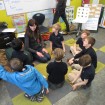 Alcuin College Gr 3/4 and Gr 10An inquiry into the experience of immigrants in historical context & contemporary society.
Alcuin College Gr 3/4 and Gr 10An inquiry into the experience of immigrants in historical context & contemporary society.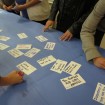 Burnett Secondary Gr 10An inquiry into how personal histories, social values and events shape the individual.
Burnett Secondary Gr 10An inquiry into how personal histories, social values and events shape the individual.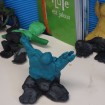 École Bilingue Gr 1Linking the concepts of force & friction to social responsibility & emotional learning.
École Bilingue Gr 1Linking the concepts of force & friction to social responsibility & emotional learning.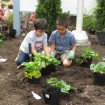 École Cedardale K, Gr 1 and Gr 3A perennial garden project that fosters a sense of community pride, ownership and appreciation.
École Cedardale K, Gr 1 and Gr 3A perennial garden project that fosters a sense of community pride, ownership and appreciation.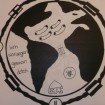 Howe Sound Gr 10 – 12 & Squamish Gr 6/7Students use art and poetry to celebrate and learn about our Canadian cultural mosaic.
Howe Sound Gr 10 – 12 & Squamish Gr 6/7Students use art and poetry to celebrate and learn about our Canadian cultural mosaic.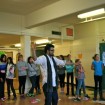 Kerrisdale Gr 6/7A cross-curricular project exploring how environment shapes the lives and culture of people.
Kerrisdale Gr 6/7A cross-curricular project exploring how environment shapes the lives and culture of people.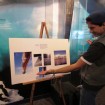 King George SecondaryAn inquiry into water systems as the foundation of life and our connection to the natural world.
King George SecondaryAn inquiry into water systems as the foundation of life and our connection to the natural world.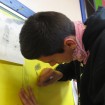 Kitsilano SecondaryInspired by First Nations history and values, students take a stand on environmental issues.
Kitsilano SecondaryInspired by First Nations history and values, students take a stand on environmental issues.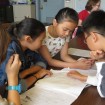 Lord Selkirk Gr 5/6Students explore the influence of culture and identity on their values.
Lord Selkirk Gr 5/6Students explore the influence of culture and identity on their values.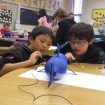 Moody Middle Gr 6/7Students explore the power of art to foster awareness of social issues around the world.
Moody Middle Gr 6/7Students explore the power of art to foster awareness of social issues around the world.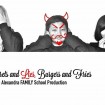 Queen Alexandra Gr 6/7An inquiry into change: how matter and culture change and how young people be agents of change.
Queen Alexandra Gr 6/7An inquiry into change: how matter and culture change and how young people be agents of change.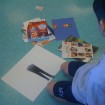 St. Francis Xavier Gr 6An exploration of stress on the self and on the environment.
St. Francis Xavier Gr 6An exploration of stress on the self and on the environment.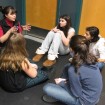 Summit Middle Gr 6/7Students present a play on how art influences culture and how culture influences art.
Summit Middle Gr 6/7Students present a play on how art influences culture and how culture influences art.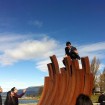 Surrey Schools Gr 4 – 12500+ students from 11 schools inquired into "Personal Identity and Embracing Uniqueness".
Surrey Schools Gr 4 – 12500+ students from 11 schools inquired into "Personal Identity and Embracing Uniqueness".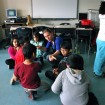 Walter Moberly Gr 4 #2Students inquire into ecosystems and zoology through movement, theatre and poetry.
Walter Moberly Gr 4 #2Students inquire into ecosystems and zoology through movement, theatre and poetry.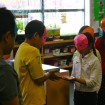 Walter Moberly Gr 4 #1Students reflect on personal identity by exploring how we change when we wear a mask.
Walter Moberly Gr 4 #1Students reflect on personal identity by exploring how we change when we wear a mask.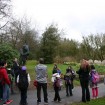 Walter Moberly Gr 4 – 7Students create comics and short stories to reflect on their identities as learners.
Walter Moberly Gr 4 – 7Students create comics and short stories to reflect on their identities as learners.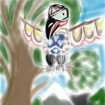 West Vancouver French Immersion SchoolsA collaborative project aims to create an inclusive community from three schools.
West Vancouver French Immersion SchoolsA collaborative project aims to create an inclusive community from three schools.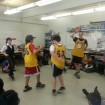 William Bridge Gr 7Students explore ways to use their creative voices to celebrate and respect diversity.
William Bridge Gr 7Students explore ways to use their creative voices to celebrate and respect diversity.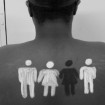 Windermere Gr 8-10Using art to reflect on the connection between identity, place, & the diversity of their school.
Windermere Gr 8-10Using art to reflect on the connection between identity, place, & the diversity of their school.
2013 Arts in Action Series
The program inspires students to lead positive personal and social changes through collaboration within the local learning communities. In 2013, 20 talented local interdisciplinary artists were placed in 35 classrooms across five school districts through the Vancouver Biennale BIG IDEAS artist collaborator grants.
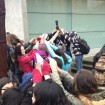 Cariboo Hill Gr 10/11/12 and Armstrong Gr 3 and 7Explore and express what can be learnt from the persuasion we face every day.
Cariboo Hill Gr 10/11/12 and Armstrong Gr 3 and 7Explore and express what can be learnt from the persuasion we face every day.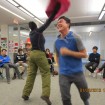 Carson Graham Gr 11/12 and Westview Gr 7Students reflect & share how to overcome bullying and its affect on their body, mind & heart.
Carson Graham Gr 11/12 and Westview Gr 7Students reflect & share how to overcome bullying and its affect on their body, mind & heart.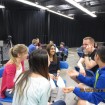 Confederation Park Gr 7 and Alpha Gr 10A shared exploration of identity, transitions, and the value of listening.
Confederation Park Gr 7 and Alpha Gr 10A shared exploration of identity, transitions, and the value of listening.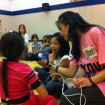 École Cederdale Gr 1 and 2An inquiry into emotions, related actions, and how these actions can impact others.
École Cederdale Gr 1 and 2An inquiry into emotions, related actions, and how these actions can impact others.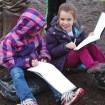 Henry Hudson K – Gr 6/7 and Kitsilano Gr 10An inquiry into the expression of feelings and their impact on others.
Henry Hudson K – Gr 6/7 and Kitsilano Gr 10An inquiry into the expression of feelings and their impact on others.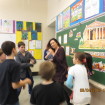 Kerrisdale Gr 3 and 6/7Student explore how they can take on positive leadership for social change.
Kerrisdale Gr 3 and 6/7Student explore how they can take on positive leadership for social change.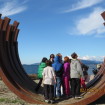 Lions Bay Gr 3, Gleneagles Gr 5/6 and Rockridge Gr 10An inquiry into transitions involving three classes from the same geographical area.
Lions Bay Gr 3, Gleneagles Gr 5/6 and Rockridge Gr 10An inquiry into transitions involving three classes from the same geographical area.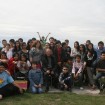 Queen Alexandra Gr 6/7This project-based learning project links Echoes to deeper rooted social justice issues.
Queen Alexandra Gr 6/7This project-based learning project links Echoes to deeper rooted social justice issues.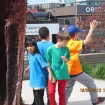 Simon Fraser Gr 4/5Expressing interconnectedness in habitats through spoken words and dance movements.
Simon Fraser Gr 4/5Expressing interconnectedness in habitats through spoken words and dance movements.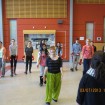 Sutherland Gr 12Fostering connections across languages (Canada and Nepal) through artistic expression.
Sutherland Gr 12Fostering connections across languages (Canada and Nepal) through artistic expression.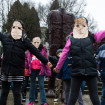 Walter Moberly Gr 4/5Students make association between the connections within our body and the city.
Walter Moberly Gr 4/5Students make association between the connections within our body and the city.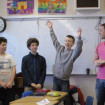 Westcot Gr 6/7Students reflect on how would they change if they put themselves in others' position.
Westcot Gr 6/7Students reflect on how would they change if they put themselves in others' position.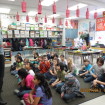 William Bridge Gr 3 and 7An inquiry into water as a critical resource inspired by Water #10.
William Bridge Gr 3 and 7An inquiry into water as a critical resource inspired by Water #10.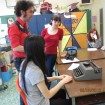 Windermere Gr 10 – 12 and Nootka Gr 7Students and senior citizens shared an exchange on changes through time.
Windermere Gr 10 – 12 and Nootka Gr 7Students and senior citizens shared an exchange on changes through time.
2012 Performance Series
The Vancouver Biennale took dance, music, drama and poetry to the streets to celebrate 2012 BC Arts and Culture and National Dance Week. An unprecedented lineup of 28 outdoor BIG IDEAS performances over eight consecutive days included 800 performers ranging from Grade 2 students to professionals.
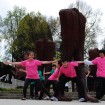 Captain Cook Gr 7Explore the topics of "Finding Voice" through celebrating individuality.
Captain Cook Gr 7Explore the topics of "Finding Voice" through celebrating individuality.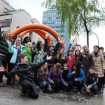 Carisbrooke Gr 6/7Inspired by Jasper, students explore & reflect on life’s twists & turns through a class poem.
Carisbrooke Gr 6/7Inspired by Jasper, students explore & reflect on life’s twists & turns through a class poem.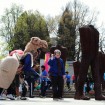 Chaffey-Burke Gr 6/7Reflect on the causes of the fall of humanities in the context of war.
Chaffey-Burke Gr 6/7Reflect on the causes of the fall of humanities in the context of war.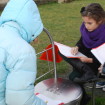 Henry Hudson Gr 2/3A Discovery of the extraordinary values of everyday elements in the ecosystem.
Henry Hudson Gr 2/3A Discovery of the extraordinary values of everyday elements in the ecosystem.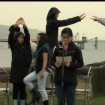 Kerrisdale Gr 7Students reflected on the true values and meanings in life.
Kerrisdale Gr 7Students reflected on the true values and meanings in life.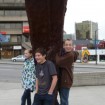 Norgate Gr 7Giving voices to people who are impacted by bullying through poetry.
Norgate Gr 7Giving voices to people who are impacted by bullying through poetry.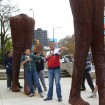 Queen Alexandra Gr 6Illuminate how past actions affect their present and future through dance.
Queen Alexandra Gr 6Illuminate how past actions affect their present and future through dance.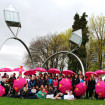 West Bay Gr 6Respond to the challenges we face in "Sharing the Planet" through poetry.
West Bay Gr 6Respond to the challenges we face in "Sharing the Planet" through poetry.
Inquiry Challenges
2010 King George School Great Race
A set of inquiry-based challenges were developed in collaboration with King George School and Learning Services of the Vancouver Board of Education. These learning challenges were piloted in 2010 where multi-grade student teams from King George School designed their exploratory routes to various Biennale sculptures. At each installation, the student team faces learning activities based on a BIG IDEA framed within a guiding question. These challenges are multidisciplinary in nature, embrace multiple-intelligences, and apply real world issues such as relationships, sustainability, First Nations issues and multiculturism.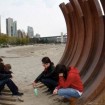 217.5 Arc x 13An inquiry around art on respecting the natural environments & fostering equilibrium.
217.5 Arc x 13An inquiry around art on respecting the natural environments & fostering equilibrium.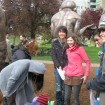 A-Maze-ing LaughterResponding to censorship on multiple levels through art media.
A-Maze-ing LaughterResponding to censorship on multiple levels through art media.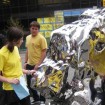 Artificial Rock #143Creating an understanding around social-emotional wellness that fits one's life.
Artificial Rock #143Creating an understanding around social-emotional wellness that fits one's life.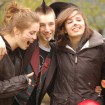 Cabeza Vainilla, Cabeza Córdoba, Cabeza ChiapasExploring and taking multiple perspectives towards a subject, be it history or art.
Cabeza Vainilla, Cabeza Córdoba, Cabeza ChiapasExploring and taking multiple perspectives towards a subject, be it history or art.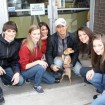 Doors of KnowledgeAn inquiry on how one sees oneself through looking within and taking multiple perspectives.
Doors of KnowledgeAn inquiry on how one sees oneself through looking within and taking multiple perspectives.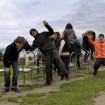 EchoesStudents are encouraged to explore how meaning is made within their immediate environment.
EchoesStudents are encouraged to explore how meaning is made within their immediate environment.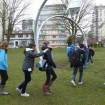 EngagementAn inquiry on the elements that compose healthy relationships.
EngagementAn inquiry on the elements that compose healthy relationships.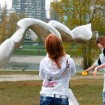 Freezing Water #7An inquiry on the Laws of Gravity and gravity’s physical influence on actions and reactions.
Freezing Water #7An inquiry on the Laws of Gravity and gravity’s physical influence on actions and reactions. History of LossAssessing possession of nostalgic artifacts and how our lifestyle impacts the environment.
History of LossAssessing possession of nostalgic artifacts and how our lifestyle impacts the environment.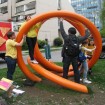 JasperA cross-curricular challenge that incorporates art and mathematical calculation.
JasperA cross-curricular challenge that incorporates art and mathematical calculation. 217.5 Arc x 13An inquiry around art on respecting the natural environments & fostering equilibrium.
217.5 Arc x 13An inquiry around art on respecting the natural environments & fostering equilibrium.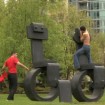 King and QueenUnderstanding the interplay of power and position in the learning environment and one's life.
King and QueenUnderstanding the interplay of power and position in the learning environment and one's life. King and QueenAn investigation into the relationship between human & machine and how it shapes our values.
King and QueenAn investigation into the relationship between human & machine and how it shapes our values.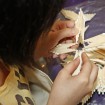 Loco-Foco-MottoStudents are prompted to re-evaluate artistic materials and the process of artistic expression.
Loco-Foco-MottoStudents are prompted to re-evaluate artistic materials and the process of artistic expression.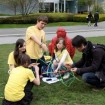 MeetingStudents are encouraged to explore forms and structures of communication and learning.
MeetingStudents are encouraged to explore forms and structures of communication and learning.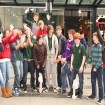 Miss MaoStudents investigate the connections between political or social commentary and public art.
Miss MaoStudents investigate the connections between political or social commentary and public art.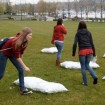 PillowsExploring the causes and consequences of homelessness and housing in an urban setting.
PillowsExploring the causes and consequences of homelessness and housing in an urban setting.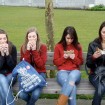 The StopBreaking the cycle of reaction and opening choices by taking time to stop.
The StopBreaking the cycle of reaction and opening choices by taking time to stop.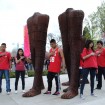 Walking FiguresStudents are encouraged to explore the disconnect between heart, mind and body in our society.
Walking FiguresStudents are encouraged to explore the disconnect between heart, mind and body in our society.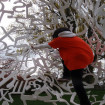 WE, 2008Students are encouraged to explore the challenges related to immigration and settlement.
WE, 2008Students are encouraged to explore the challenges related to immigration and settlement. Wind WavesStudents are encouraged to explore the endless possibilities within their natural world.
Wind WavesStudents are encouraged to explore the endless possibilities within their natural world.